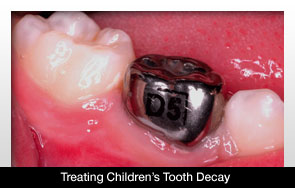 |
A needleless, drill-free method of treating tooth decay may have been created by a New Zealand college.
University of Otago researchers generated this new treatment, called the Hall technique, for the purpose of limiting the anxiety of children when they visit the dentist.
There were around 190 children ages 5 through 8 studied to compile the data. About 100 children were treated by using this new method and the others were treated using conventional methods.
The new process includes the placement of a stainless steel crown over a baby molar to seal the decay instead of using a drill to take out the decay and then add a filling. With the new method, the decay stops or slows down because the tooth is deprived of nutrients. The crown stays in place until it naturally falls out with the tooth.
The new method resulted in less dental anxiety among those children compared to the ones treated with the more standard methods. The final numbers showed that about 90 percent of the children enjoyed their dental visit when treated with the new method compared to only about 52 percent who enjoyed their visit with traditional treatment.
The new method also is 20 minutes faster and more successful.
There could be an even greater impact in the future. If people enjoy their dental visits as children, they will be more likely to visit the dentist as they grow older.
More work, however, needs to be done to determine the exact reasons for the more enjoyable dental visits.
As it stands now, these crowns are more expensive that traditional amalgam or white fillings. In the long term, however, this method could be more cost effective based on the fact that the new treatment is successful at a higher rate.
The study was funded by the Health Research Council of New Zealand.


